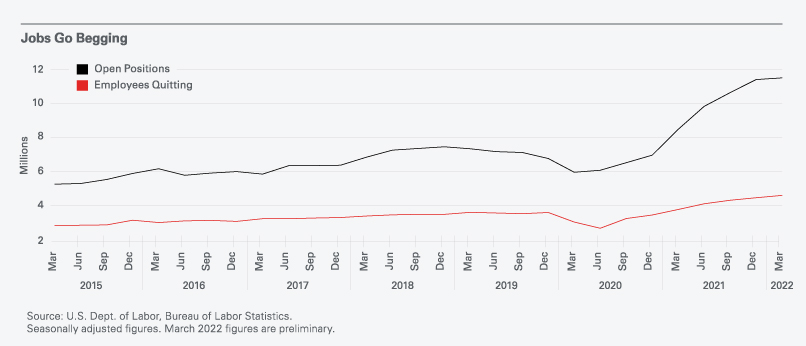Takeaways
- In a post-pandemic talent market, where employees are quitting and jobs are going unfilled, directors need to take an active role in shaping workplace culture.
- With culture an increasingly important factor in attracting and retaining talent, boards need to be well-informed about employee issues and attuned to concerns.
- Although culture can seem nebulous, a combination of employee engagement, regular HR data reports to the board and other tools such as employee focus groups can help directors to oversee and influence culture and company-employee relations.
- Employees may have greater loyalty to an employer whose mission and values align with their own, and accordingly, companies may need to consider whether to take positions on societal issues that are important to their employees.
The global pandemic has transformed the employer-employee relationship in ways that we could not have imagined two years ago, including widespread remote working and hybrid schedules. Moreover, the labor market has been profoundly altered by the so-called “Great Resignation,” which shows no sign of letting up: March 2022 set new records in the U.S. for both the number of employees who quit their jobs and positions that are unfilled.
With talent at such a premium today, recruiting and human resources practices that were once routinely left to management have become mission-critical for many businesses and demand board attention.
Compensation is always a key component of recruiting and retention, of course, and many companies have increased wages to draw workers. But in the competition for the most valuable and skilled employees, culture is increasingly important.
Surveys suggest that employees may experience higher job satisfaction when sharing a workplace with colleagues whose views align with their own. Conversely, social and political divisions among employees can be distracting and lead to disruption in the workplace. According to the 2022 Edelman Trust Barometer, almost six in ten employees choose a workplace based on shared values and expect their organization’s chief executive officer to take a position on major societal issues. And more employees believe that their employers should take a stance on societal and cultural issues, even if unrelated to the organization's business. Organizations are increasingly being forced to consider if and when to acknowledge social and political events, and the appropriate corporate response.
The importance of culture, beginning at the top.
In the current market, more than ever, it is vital that organizations cultivate a culture where employees feel connected to the organization’s values and mission. A positive workplace culture where employees feel valued is not simply a “nice to have,” but a major differentiating factor in recruiting and retention.
Boards need to work proactively with their management teams to set the tone at the top. An organization’s values and strategic intent should be clearly communicated to employees. Management and the board should demonstrate commitment to these stated principles and be prepared to "walk the talk." That includes calling out unacceptable behavior and rooting out “bad apples.” Work-from-home and the hybrid work model have complicated the task of cultivating corporate culture, but the imperative has not changed.
At the same time, it should be a priority to engage with employees to understand their priorities and concerns. Engagement can strengthen the employer-employee relationship and help make employees feel that they have a voice in defining the organization’s values and improving the employee experience. This can take the form of focus groups, listening sessions, committee representation and special projects, with the aim of garnering information about employees needs and conveying to employees that they are valued contributors to the success of the organization.
A board should receive regular reports from management with hiring and attrition data by office, department, job title, protected status and geographic location. This data can highlight what is working and areas that need attention.
An organization that does not focus on cultivating a positive culture risks losing critical talent. Studies have shown a high correlation between negative workplace culture and attrition. In addition, an organization’s reputation for a negative workplace environment will likely spread quickly through social media and can negatively impact hiring efforts. What's more, an organization that does not act to address negative workplace conditions or uphold its core values risks lawsuits, bad press, customer blowback and damage to its reputation among investors, all of which can have a significant impact on an organization’s results and stock price.
Culture can seem nebulous, though. How can boards help shape it? Here are some concrete steps.
Receive regular reports with employment data and monitor progress in addressing any negative trends.
Good data is an important starting point. A board should receive regular reports from management with hiring and attrition data by office, department, job title, protected status and geographic location. This data can highlight what is working and areas that need attention. As part of their corporate oversight, directors need to be informed about risks to the organization with respect to hiring, attrition and workplace culture. Detailed reports can help directors spot patterns and potential problems.
Management should also report on the needs, desires and work styles of the workforce, including attitudes about remote work and work-life balance. Working with management, the board can develop an action plan to address any negative findings, then monitor progress in addressing areas of employee dissatisfaction. Boards may consider adding a director with human resources experience and/or forming a workplace culture subcommittee to oversee and monitor workplace culture issues.
Clearly define the organization’s values and consistently communicate these principles to its employees.
Boards should play an active role in defining the company’s values, communicating to employees the importance of its values and ensuring that the organization acts in accordance with them. A strong commitment to clearly stated values can distinguish the company in a competitive job market. Employees are more likely to join and remain loyal to an organization with values that align with their own.
Consider framing a policy with respect to commenting on political and social issues.
A board should consider establishing a clear policy that defines the circumstances in which the corporation will take a position on political and social issues, the process for approving the substance of any statement made on behalf of the corporation and whether any such statement will be limited to internal communications or disseminated more broadly. A board should consider requiring that statements made on behalf of the corporation be vetted with a board committee and the corporation's internal and external communications team before dissemination.
Develop programs to engage with employees.
If the organization does not already have focus groups and listening sessions with employees, the board may want to suggest those to elicit information about the employee experience.
Another tool is upward feedback and/or 360-degree reviews that incorporate the perspective of direct reports, supervisors and peers. These can provide a more holistic view of employees’ performance and experiences and potentially identify managers who may be undermining the organization’s culture and values. (A third-party human resources consultant can be retained to preserve the confidentiality of feedback from individual employees.)
Information can be used by management and the board to identify and address negative workplace conditions and develop tools to incentivize and retain employees. The board and management can also use employee engagement to solicit input on potential corporate initiatives.
Maintain employee trust, confidentiality and anti-retaliation protections.
It is essential that management and any human resources consultant keep employee feedback confidential to the extent practicable, communicate those confidentiality protections to employees and assure employees that the organization prohibits all forms of retaliation in response to complaints or reports of negative workplace conditions. This is another area where board oversight is essential because it is possible that some feedback may be critical of management.
Ensure compliance with company policies and disciplinary procedures.
Workplace policies need to be continuously updated with changes of laws and circumstances. Moreover, employee training and compliance with policies need to be monitored on an on-going basis ― additional areas where board oversight may be appropriate. If there are specific employee complaints, the board should ensure that the organization’s legal and human resources teams and/or outside counsel conduct prompt, impartial and thorough investigations. The board should ensure that the organization takes swift action through appropriate disciplinary measures against bad actors, no matter how critical those individuals are to the organization.

View other articles from this issue of The Informed Board
- In the Name of the Company: When Stockholders Interfere in the Boardroom
- Preparing for the Unexpected: Problematic Partners, Forced Exits and Extractions
- How Antitrust Regulators and the SEC Are Advancing the Wider Biden Agenda
- Two Directors Share Lessons on Building a Highly Functioning Board
See all the editions of The Informed Board
This memorandum is provided by Skadden, Arps, Slate, Meagher & Flom LLP and its affiliates for educational and informational purposes only and is not intended and should not be construed as legal advice. This memorandum is considered advertising under applicable state laws.

